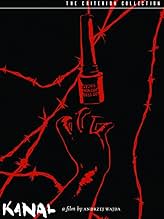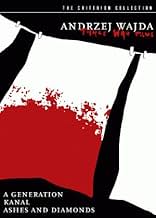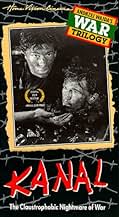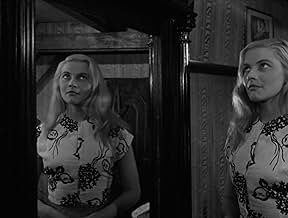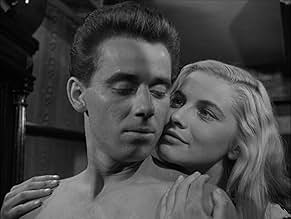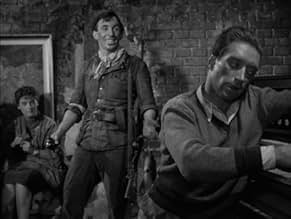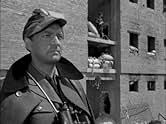AVALIAÇÃO DA IMDb
7,9/10
8,5 mil
SUA AVALIAÇÃO
Em 1944, durante a revolta de Varsóvia contra os nazistas, o tenente polonês Zadra e seus combatentes da resistência usam o sistema de esgoto de Varsóvia para escapar do cerco alemão.Em 1944, durante a revolta de Varsóvia contra os nazistas, o tenente polonês Zadra e seus combatentes da resistência usam o sistema de esgoto de Varsóvia para escapar do cerco alemão.Em 1944, durante a revolta de Varsóvia contra os nazistas, o tenente polonês Zadra e seus combatentes da resistência usam o sistema de esgoto de Varsóvia para escapar do cerco alemão.
- Direção
- Roteirista
- Artistas
- Indicado para 1 prêmio BAFTA
- 1 vitória e 2 indicações no total
Vladek Sheybal
- Composer Michal
- (as Wladyslaw Sheybal)
Wlodzimierz Bednarski
- Insurgent
- (não creditado)
Zenon Dadajewski
- Insurgent
- (não creditado)
Avaliações em destaque
That this movie was made is a near miracle, since it squeaked out barely 3 years after Stalin died; and the Polish film industry could even begin to suggest that Poles could struggle against the Germans without Soviet "fraternal" help. It looks likely that it was saved from oblivion by the Silver Palm (1957), at least in Poland. My suspicion that this got past the Party censors as a Dantean allegory about the worker and peasant struggles, with each character and episode exposing some lesson. However, like Ashes and Diamonds, much of the real message is just at the surface: regular Poles struggling for a better future.
The real hidden message of the film is a metaphorical struggle against Soviet oppression. Wajda seems to suggest this by quoting Szczepanski(1944): "... But know this: from our tombstones A victorious new Poland will be born And you will not walk this land You Red Ruler of bestial forces!" (1) Indeed the resolution suggests the Stalinist Inferno is far from over. Those who have tried to bring light to the world suffer a Promethean fate.
What seems remarkable to me is the positive spirit, humor, and love of life that most of the characters display in the face of their passage into the underworld. There is additional irony (humorous to me), for example, that the composer attempts to play a particularly patriotic Chopin, but is then ordered to play "something with feeling:" an inane dance tune. (By the way, the Beckstein piano that the composer tries to protect was made by a company that provided Hitler with crucial early support.)
It is also remarkable that such a dark, almost anti-heroic view of combatants was made only 12 years after the event. It is not so far from the spirit of Ernie Pyle, and just think how long it took to make Band of Brothers.
(1) Interview on www.wajda.pl
The real hidden message of the film is a metaphorical struggle against Soviet oppression. Wajda seems to suggest this by quoting Szczepanski(1944): "... But know this: from our tombstones A victorious new Poland will be born And you will not walk this land You Red Ruler of bestial forces!" (1) Indeed the resolution suggests the Stalinist Inferno is far from over. Those who have tried to bring light to the world suffer a Promethean fate.
What seems remarkable to me is the positive spirit, humor, and love of life that most of the characters display in the face of their passage into the underworld. There is additional irony (humorous to me), for example, that the composer attempts to play a particularly patriotic Chopin, but is then ordered to play "something with feeling:" an inane dance tune. (By the way, the Beckstein piano that the composer tries to protect was made by a company that provided Hitler with crucial early support.)
It is also remarkable that such a dark, almost anti-heroic view of combatants was made only 12 years after the event. It is not so far from the spirit of Ernie Pyle, and just think how long it took to make Band of Brothers.
(1) Interview on www.wajda.pl
This is certainly NOT a feel-good film, as it deals with the horrors of the Nazis and their crushing of the Warsaw uprising of 1944. After all, there is no way or reason to make this a nice or fun movie to view. It just isn't possible. BUT, we are treated to an intensely realistic and viscerally disturbing film showing the war in all its awfulness. The first portion of the film is set in crumbling buildings and the nobility of the cause is apparent. However, the vast majority of the film is set in the sewers (hence the title "Kanal") and the characters, over time, lose some of their nobility and just ache to survive. The film is intensely claustrophobic and the filth they move about in literally looks like raw sewage--so as the characters fight for life and, in most cases, give up hope, you find yourself being pulled into their world and their terror. A great, though intensely awful film to watch. So, it comes as no surprise that I would not recommend this film to children or people afflicted with claustrophobia.
PS--if the musician seems familiar, it's because Wladyslaw Sheybal (also known as "Vladek Sheybal") is one of the Bond Villains in the movie FROM Russia WITH LOVE.
PS--if the musician seems familiar, it's because Wladyslaw Sheybal (also known as "Vladek Sheybal") is one of the Bond Villains in the movie FROM Russia WITH LOVE.
I think everyone who saw this film knows that it's a masterpiece, but maybe not everyone knows how authentic the film is. The writer of the screenplay - Jerzy Stefan Stawinski - is in fact the Lieutenant Zadra responsible for his platoon. Stawinski wrote down his own war experiences here with impressing honesty.
Another thing that may be interesting in this film is the main female character - Daisy. She isn't supposed to be a superwoman as some suggested. In fact there were several thousands of women fighting in this uprising. All of them that survived it were given the status of soldiers by Germans. It was the first time in the world's history when women received such a status. During the uprising many of them were carrying mail via sewers, so Daisy is rather a typical character in this role. It would be more surprising if the guide was a man.
Another thing that may be interesting in this film is the main female character - Daisy. She isn't supposed to be a superwoman as some suggested. In fact there were several thousands of women fighting in this uprising. All of them that survived it were given the status of soldiers by Germans. It was the first time in the world's history when women received such a status. During the uprising many of them were carrying mail via sewers, so Daisy is rather a typical character in this role. It would be more surprising if the guide was a man.
Watching Andrzei Wajda's war movie 'Kanal' one is stuck just by how short the interval was between the making of this film and the horrors it depicts. And while there were plenty of British and American war films made in the 1950s, it was perhaps easier to turn "our" story into the black-and-white banality of heroic fable, besides which, "we" could also make movies without communist censors looking over our shoulders. Wajda here chooses to fashion a tale centred on the collapse of the Polish resistance to the Nazis: the last survivors take to the sewers, the Germans pump gas down, and you know as soon as the film starts that there will be no happy endings, even for the survivors. It's a tale whose laconic nihilism would be remarkable in any era: I was reminded of the (much later) BBC nuclear-themed drama 'Threads', another tale of underground life facing extinction, while the dialogue, stoical in the face of impossible fate, offers more direct echos, for it made me think of the films of another Polish master, Krystoff Kieslowski. The most remarkable things in this film are the poetically bleak sequence of scenes that end it; it's biggest failing is the score, that (as with many films of this era) feels the need to describe the plot, and not merely to complement it. Occasionally other aspects of the movie also give away its age, but what's much more notable is the modernity (and hopelessness) of its approach to its material. A fine achievement, dating from an era when the events it portrayed were the present, not the past.
This is an excellent movie. It tells the story of the last stages of the Warsaw Uprising against the Nazis. A small unit of Polish Resistance fighters are ordered to fall back to a central position by going through the sewers.
Most of the actions happens in the eerie confines of the sewers, which creates a very gripping atmosphere. However, the most interesting aspect of the movie is the character development. All of the characters are so different and changeable. No stereotypical characters in this movie!
Andrzej Wajda is a truly great director. He is able to make unique movies based on the character development, rather than relying on gimmicks to gain the audience's attention. In this movie you never know what is ultimately going to happen to the resistance fighters until the final scenes.
Most of the actions happens in the eerie confines of the sewers, which creates a very gripping atmosphere. However, the most interesting aspect of the movie is the character development. All of the characters are so different and changeable. No stereotypical characters in this movie!
Andrzej Wajda is a truly great director. He is able to make unique movies based on the character development, rather than relying on gimmicks to gain the audience's attention. In this movie you never know what is ultimately going to happen to the resistance fighters until the final scenes.
Você sabia?
- CuriosidadesDirector Andrzej Wajda was himself a fighter in the Polish resistance movement against the Nazis in World War II and several scenes in the film were based on his experiences.
- Erros de gravaçãoWhen Korab is attacking Goliath self-propelled tracked mine, a wire pulling it can be seen.
- Citações
Narrator: These are the tragic heroes: watch them closely in the remaining hours of their lives.
Principais escolhas
Faça login para avaliar e ver a lista de recomendações personalizadas
- How long is Kanal?Fornecido pela Alexa
Detalhes
- Data de lançamento
- País de origem
- Central de atendimento oficial
- Idiomas
- Também conhecido como
- Canal
- Locações de filme
- Empresa de produção
- Consulte mais créditos da empresa na IMDbPro
- Tempo de duração1 hora 31 minutos
- Cor
- Mixagem de som
- Proporção
- 1.37 : 1
Contribua para esta página
Sugerir uma alteração ou adicionar conteúdo ausente


